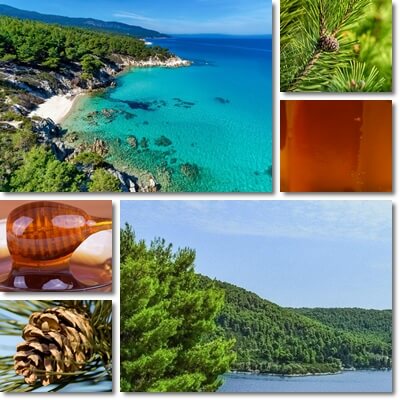Halkidiki is not just the perfect holiday destination in Greece, but also the home of some of the best Greek honeys. Halkidiki pine honey is a specialty Greek honey produced on the peninsula of Halkidiki in Greece.
It is a high quality, pure, raw, local honey and one of the best Greek honey varieties. If you like somewhat stronger tasting honeys with warm, resinous flavors and a beautiful, dark orangey-brown color, then Halkidiki Greek pine honey is something you should definitely try.
What is Greek Halkidiki pine honey?
As its name suggests, Greek Halkidiki pine honey is a pine tree honey variety from Greece, more exactly, from the Greek peninsula of Halkidiki, also called Khalkidhiki, Chalkidiki, Chalkidike or Chalcidice. Greek Halkidiki pine honey is a variety of forest honey or honeydew honey which means it is not produced from nectar collected from actual flowers, but rather from honeydew secreted by insects that inhabit pine trees, such as aphids.
Find out more about forest honeys.

How is Greek Halkidiki pine honey made?
Forest honeys or honeydew honeys such as Greek Halkidiki pine honey and pine honey in general are made not from flower nectar, but from honeydew. Honeydew is a sweet, sugary, sticky and liquid secretion produced by small insects that feed on tree sap. Honeybees collect the honeydew and process it using digestive enzymes to produce an edible honey similar to floral honeys. Honeydew is for honey the equivalent of flower nectar, that is, the main raw material needed to make honey.
Honey bees are relocated in the wild in the proximity of naturally occurring pine forests so they may forage for honeydew themselves which makes Greek Halkidiki pine honey a wild pine tree honey variety.
What does Greek Halkidiki pine honey look like?
Greek Halkidiki pine honey is a medium dark honey with a beautiful orangey-brown color and faint green reflexes. The honey variety is quite dense and viscous compared to more common floral honeys such as acacia, for example. The thick consistency of Greek Halkidiki honey is a result of a low water content.
What does Greek Halkidiki pine honey taste like?
Greek Halkidiki pine honey is a particular tasting honey: the honey tastes quite sweet, with a faint, bitter, almost medicinal aftertaste and rich, warm, resinous flavor notes. Because it has a low water content, the Greek pine honey is thick and viscous, with an exquisite consistency. The honey is dense, soft and smooth, with a velvety mouthfeel.

Crystallization time
Does Greek Halkidiki pine honey crystallize? The Greek pine honey variety crystallizes very slowly. Under the right conditions, the honey will not crystallize at all for at least one year to a few years. Right conditions meaning being kept lidded and stored in a glass jar in a dark, cool place, without being intentionally heated or stirred. If the honey has been filtered, time until crystallization will increase.
I have two jars of 100% pure, raw (unpasteurized), filtered Greek wild pine honey from Halkidiki from almost two years ago and it still has not crystallized one bit. To compare, my acacia honey crystallizes in about a year, although it too can technically stay liquid for several years.
Also see the benefits of crystallized honey.
Greek Halkidiki pine tree honey properties:
- Natural food product
- Raw, unpasteurized (ideal)
- Can be filtered or unfiltered
- Type of forest honey, or honeydew honey
(as opposed to floral honey) - Low water content and dense consistency
- Thick, viscous, smooth honey
- Slow crystallization time
- Low glucose – high fructose content
(reason for the slow crystallization of the honey) - Low pH
- Antimicrobial properties: antibacterial, antifungal, antiviral
- Soothing, reparative effects
- Nutritional profile: contains trace amounts of several essential vitamins and minerals
(but overall negligible nutritional value) - Gluten-free, vegetarian food product
*Not vegan
Benefits and uses of Greek pine honey
Is Greek Halkidiki pine honey good for you? Discover the top benefits and uses of the pine tree honey variety below:
- Good for low blood sugar. Eating a tablespoon of the Greek pine honey can raise blood sugar levels almost instantly, energize and restore balance to the body.
- Excellent remedy for a sore throat. The Greek pine honey variety is dense and viscous and forms a protective coating over the throat lining, calming inflammation and irritation and relieving soreness.
- Benefits for upper respiratory tract infections. Bioactive compounds in Greek pine honey such as hydrogen peroxide, the enzyme glucose oxidase and other antimicrobial agents reduce bacterial load, while the low pH combats and prevents infection, exerting a local antimicrobial action with measurable benefits.
- Antibacterial, antifungal, antiviral properties. 100% pure, raw Greek pine honey and any honey that has not been heated or otherwise processed exhibits antibacterial, antifungal and even antiviral activity.
Note: Honey enhanced with propolis has additional immunomodulatory effects and can activate the immune system response in the fight against infection. - Benefits for acid reflux and heartburn. Greek Halkidiki pine honey can help soothe irritation of the throat and esophagus lining caused by regurgitation of stomach juices in acid reflux disease, and relieve heartburn.
- Benefits for gastritis. Taking 100% pure Greek Halkidiki pine honey on an empty stomach in the morning is soothing for the stomach lining and helps combat inflammation and initiate reparative processes, aiding with gastritis treatment.
- Good for coughing. Taking raw honey such as Greek pine honey can help calm cough caused by a respiratory infection and acid reflux disease (GERD). It is important to not eat or drink anything at least 30 minutes to an hour after taking the honey.
- Gentle exfoliating properties. Apply Greek Halkidiki pine tree honey to the face, let sit for 15-20 minutes, then wash with warm water or clean using a soft cloth soaked in warm water for gentle exfoliation and soft skin.
- Benefits for oily skin. Greek Halkidiki pine honey applied to the face as a mask helps remove excess sebum without affecting the natural oil production of the skin, helping maintain skin balance.
- Benefits for dry skin. Greek Halkidiki pine honey applied to the face as a mask nourishes and rehydrates the skin and combats dullness.
- Tightening effect. The Greek pine honey used as a face mask cleans and minimizes pores which further reduces sebum production for more balanced skin.
- Brightening effect. The Greek pine honey used regularly as a face mask has a brightening effect and helps achieve more even skin, reducing the appearance of blemishes, redness and acne scars.
- Good for minor burns and small wounds. Greek Halkidiki pine honey can be applied topically on minor burns and small wounds (scratches, insect bites) to calm irritation and itching and advance wound healing.
Antibacterial properties of Greek pine honey
- low pH – inhibits bacteria growth
- source of antibacterial agents (hydrogen peroxide, glucose oxidase) – actively reduce bacterial load
- low moisture content and a dense, viscous consistency – forms a protective, impenetrable coating, preventing infection
What are the side effects?
Risk of allergic reactions
It is possible to be allergic to Greek Halkidiki pine honey or any pine tree honey or honey variety. Seek medical help immediately if you experience a skin rash with itchy, red welts or difficult breathing (wheezing, coughing, hoarseness, swelling of the lips, tongue or throat).
Pollen contamination
Although it’s a honeydew honey, it’s possible for pine tree honey to be contaminated with pollen particles from flowers the bees may have fed on. Bees do no discriminate between food sources and will collect nectar and, incidentally, also pollen from flowers if these are available near their main food source, in this case, pine trees.
